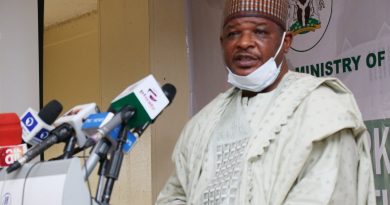Nigeria To Receive 176,000 J&J COVID-19 Vaccines; NCDC calls for action as Cholera kills 816 In 22 States, FCT
Nigeria is expected to receive 176,000 doses of the Johnson and Johnson COVID-19 vaccines on Wednesday.
Executive Director, National Primary Health Care Development Agency, Faisal Shuaib, confirmed this at a news conference in Abuja on Tuesday.
He said the J&J vaccine, like the AstraZeneca, is safe and efficient against the coronavirus disease, including the deadlier Delta variant.
The single-shot J&J vaccine is expected to boost Nigeria’s COVID-19 fight with the Delta variant sparking fears of a third wave of the pandemic.
Dr. Shuaib had recently announced that the second phase of the COVID-19 vaccination programme would commence soon.
The exercise had earlier been scheduled to begin on Tuesday, but it was postponed due to “unforeseen circumstances,” according to a spokesperson in the Office of the Secretary to the Government of the Federation, Willie Bassey.
The need for the rollout of the second batch of the vaccines has, however, become crucial as Nigeria gradually returns to seeing a spike in infections.
As of Monday, 422 new cases of COVID-19 were recorded in the country, with five more deaths.
According to the Nigeria Centre for Disease Control (NCDC), the infections were recorded in nine states. Lagos maintained the lead with 190 cases, followed by Rivers (86) and Ogun (85).
Others are Oyo (22), FCT (20), Kwara (7), Edo (5), Abia (4), and Bayelsa (3)
So far, a total of 178,508 cases have been confirmed, 165,983 patients have recovered and 2,192 deaths have been recorded in 36 states, including the Federal Capital Territory.
More than 200 million cases of the pandemic have been confirmed globally, with the death toll reaching four million.
Meanwhile the Nigeria Centre for Disease Control (NCDC) has called on state governments and citizens to take more proactive steps to combat the outbreak of cholera across states in Nigeria.
The agency made the appeal in a report released on Monday, where it stated that there have been 31,425 suspected cases of cholera and 816 deaths reported from 22 states and the FCT, between January 1 and August 1, 2021.
The affected states are Benue, Delta, Zamfara, Gombe, Bayelsa, Kogi, Sokoto, Bauchi, Kano, Kaduna, Plateau, Kebbi, Cross River, Niger, Nasarawa, Jigawa, Yobe, Kwara, Enugu, Adamawa, Katsina, Borno and the FCT.
According to the NCDC, the recent outbreak has been exacerbated by poor access to clean water, open defecation, poor sanitation, and hygiene.
Although the NCDC activated the National Cholera Emergency Operations Centre (EOC) on June 22 and has deployed rapid response teams to support the most affected states, it warned that those actions won’t be enough.
“None of these medical interventions will solve the underlying issues leading to cholera outbreaks,” it warned.
“Cholera is a waterborne disease, and the risk of transmission is higher when there is poor sanitation and disruption of clean water supply.”
Specifically, practices such as the wrong disposal of refuse and practices such as open defecation endanger the safety of water used for drinking and personal use.
“These lead to the spread of water-borne diseases such as cholera. Without proper water, sanitation, and hygiene (WaSH), Nigeria remains at risk of cholera cases and deaths,” the NCDC added.
To address the underlying issues in the long term, there is a need for access to safe drinking water, maintenance of proper sanitation and hygiene.
“We continue to advocate for State Governments to prioritise action for solutions that ensure access to and use of safe water, basic sanitation and good hygiene practices in communities,” it added.
Also, the agency urged Nigerians to “keep their environments clean, only drink or use water that is boiled and stored safely, ensure food is cooked and stored in a clean and safe environment, avoid open defecation and wash their hands regularly with soap and running water”.
The NCDC says the long-term solution for cholera control lies in access to safe drinking water, maintenance of proper sanitation and hygiene.
Apart from calling for stronger water, sanitation, and hygiene (WaSH), the NCDC is also ramping up efforts to stop the outbreak through the EOC, which is hosted at the NCDC includes representation from the Federal Ministries of Environment and Water Resources, National Primary Health Care Development Agency (NPHCDA), World Health Organization (WHO) and partners.
So far, it has deployed rapid response teams to Benue, Kano, Kaduna, Zamfara, Bauchi, and Plateau State, which are the most affected states.
Additionally, it has, along with its partners, provided states with commodities for case management and laboratory diagnosis, materials for risk communications, response guidelines among other support.
From July 24 to 28, a reactive oral cholera vaccine (OCV) campaign led by NPHCDA was conducted in Bauchi LGA.
The Cholera outbreak in Nigeria has worsened in recent months with more states reporting deaths, adding pressure to an already stretched health sector that has battled the COVID-19 pandemic and is currently weighed down by the strike by resident doctors which is now in its second week.
On Saturday, the Katsina State Government confirmed that it had recorded over 60 Cholera deaths.
“Presently, we have over 1,400 confirmed cases of cholera with over 60 recorded deads,” the Katsina State Commissioner for Health, Yakubu Danja, said during the 2021 Annual General Meeting of the State chapter of Nigerian Medical Association (NMA) held in the state capital.
The NCDC in its report advised Nigerians to visit a health facility immediately if they have sudden onset of profuse watery diarrhoea, nausea, vomiting, and weakness.
“Cholera is preventable and treatable; however, it can be deadly when people who are infected do not access care immediately,” it warned.




